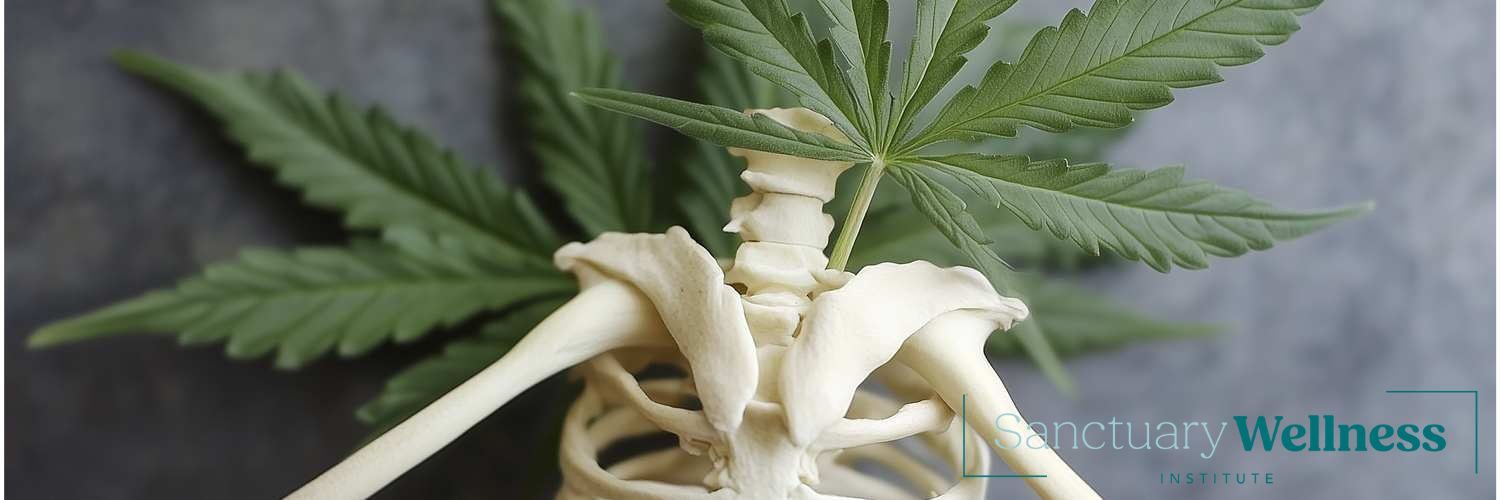Medical Marijuana for Fibrous Dysplasia
- John DiBella
- Published: October 22, 2024
- Fact-checked by Dr. Desiree Granados

Fibrous dysplasia is a rare bone disorder that can cause pain, fractures, and other skeletal issues. Individuals living with this condition often seek alternative treatments to manage their symptoms, especially when traditional options fall short.
Medical marijuana is a potential option for alleviating pain and discomfort associated with fibrous dysplasia. But how effective is cannabis for this condition? In this blog, we’ll explore how marijuana might help manage fibrous dysplasia symptoms and what steps are needed to obtain a medical marijuana card.
Does Marijuana Help With Fibrous Dysplasia?
Research suggests that medical marijuana might help alleviate symptoms associated with fibrous dysplasia, particularly chronic pain and inflammation. While studies specifically focused on cannabis and fibrous dysplasia are scarce, marijuana’s well-documented effects on pain management, muscle relaxation, and mood improvement make it a potential aid for those suffering from this condition.
Cannabis works through its interaction with the endocannabinoid system (ECS), which helps regulate various bodily functions like pain perception, inflammation, and mood. THC and CBD, the two primary compounds in marijuana, have been found to reduce chronic pain in various conditions.
For individuals with fibrous dysplasia, marijuana might provide relief from bone pain, muscle spasms, and the emotional toll of living with a chronic condition. However, it’s important to note that while marijuana may help manage symptoms, it is not a cure for the disease itself.

What Is Fibrous Dysplasia and What Are Its Symptoms?
Fibrous dysplasia is a genetic disorder where benign fibrous tissue develops in place of healthy bone. This weakens the affected bones, leading to deformities, fractures, and chronic pain. The condition typically presents in childhood or adolescence and is caused by genetic mutations. While it may affect any bone in the body, it commonly impacts the skull, arms, legs, and ribs.
Some common symptoms of fibrous dysplasia include:
- Bone pain
- Fractures or deformities
- Swelling or tenderness in affected areas
- Limited range of motion in joints near the affected bones
The severity of symptoms can vary widely. Some individuals experience mild discomfort, while others suffer from debilitating pain and frequent fractures. Traditional treatments for fibrous dysplasia include pain management with medications like NSAIDs, physical therapy, and, in severe cases, surgery. However, these methods may not be enough to fully alleviate pain, which is why some individuals turn to medical marijuana as a complementary treatment option.
Can You Get a Medical Marijuana Card for Fibrous Dysplasia?
Currently, the only state that specifically lists Fibrous Dysplasia as a qualifying condition for medical marijuana is Illinois. Chronic pain, a hallmark symptom of fibrous dysplasia, is listed as a qualifying condition in about 25% of U.S. states.
However, in states like New York, Virginia, and Washington D.C., physicians may recommend medical marijuana to any patient they feel could benefit from its therapeutic properties. It’s important to check your state’s laws to find out if you qualify for a medical marijuana card.
At The Sanctuary, we help individuals navigate the medical marijuana card application process in states like Pennsylvania, Connecticut, Florida, and more. If you’re interested in learning how to obtain a medical marijuana card, feel free to explore our medical marijuana card services.
How to Use Marijuana for Fibrous Dysplasia
If you’re considering using marijuana to help manage fibrous dysplasia symptoms, there are various methods available, each with its own set of advantages. Here are a few common options:
- Smoking/Vaping: This method provides immediate relief but may not be suitable for everyone, especially those with respiratory issues.
- Edibles: Gummies, chocolates, and other cannabis-infused edibles offer a longer-lasting effect but can take longer to kick in. This option is ideal for those who prefer a more controlled, gradual onset.
- Tinctures/Oils: Placing a few drops of cannabis oil under the tongue provides relatively fast relief without the need for inhalation. This method also allows for precise dosing.
- Topicals: Cannabis-infused creams and lotions can be applied directly to the affected areas to help with localized pain and inflammation.
It’s essential to consult with a medical marijuana doctor to determine which method and dosage might be most effective for managing your specific symptoms. They can guide you through the process and help ensure you are using marijuana safely and effectively.
What Are the Best Marijuana Strains for Fibrous Dysplasia?
The best marijuana strains for managing fibrous dysplasia symptoms often depend on the individual’s unique needs. However, some strains may be more effective at reducing pain, inflammation, and muscle spasms. Here are a few popular strains to consider:
- ACDC: High in CBD and low in THC, this strain offers pain relief without the psychoactive effects, making it ideal for daytime use.
- Granddaddy Purple: Known for its sedative effects, this indica strain may help with pain and sleep disturbances.
- Harlequin: Another high-CBD strain, Harlequin provides pain relief while helping to maintain focus and energy levels.
- Northern Lights: A classic indica strain, Northern Lights is often used to treat pain and insomnia, making it ideal for evening use.
If you’re unsure which strain might work best for your symptoms, check out our blog on the differences between indica and sativa to learn more about how different types of marijuana can affect the body.
Conclusion
Medical marijuana might offer significant relief for individuals suffering from the chronic pain and discomfort associated with fibrous dysplasia. While not a cure, cannabis has the potential to help manage pain, reduce muscle spasms, and improve the overall quality of life for those dealing with this rare condition. If you’re interested in exploring medical marijuana as a treatment option, The Sanctuary can guide you through the process of obtaining a medical marijuana card.
If you’re ready to begin the application process, schedule an appointment with one of our medical marijuana doctors today. We provide services in several states, including Pennsylvania, Ohio, Florida, and more. Take the first step toward better symptom management by exploring your options for a medical marijuana card.
States Where We Offer Medical Marijuana Card Services
How we reviewed this article:
- Mark C. Bicket, Elizabeth M. Stone, and Emma E. McGinty (2023). Use of Cannabis and Other Pain Treatments Among Adults With Chronic Pain in US States With Medical Cannabis Programs
https://jamanetwork.com/journals/jamanetworkopen/fullarticle/2800119 - S. Srakocic (2024). Can You Use CBD as a Muscle Relaxer?
https://www.healthline.com/cbd/is-cbd-a-muscle-relaxer - Cleveland Clinic (2023). Fibrous Dysplasia
https://my.clevelandclinic.org/health/diseases/17902-fibrous-dysplasia - Johns Hopkins (2024). Fibrous Dysplasia
https://www.hopkinsmedicine.org/health/conditions-and-diseases/fibrous-dysplasia - Leafly (2024). Granddaddy Purple
https://www.leafly.com/strains/granddaddy-purple - Leafly (2024). Northern Lights
https://www.leafly.com/strains/northern-lights
Current Version
October 22, 2024
Written By
John DiBella
Fact-checked By
Dr. Desiree Granados
Editorial Process
Our Editorial Process
Other Posts About Medical Marijuana Treatment

John DiBella is the co-founder and CEO at The Sanctuary Wellness Institute. His goal is to foster healthier lifestyles to improve individuals’ quality of life and health span through online medical and non-medical services. When he’s not writing health & wellness articles for The Sanctuary, he enjoys hiking, camping, surfing and sailing.







